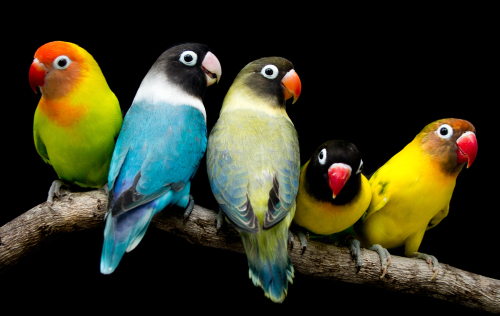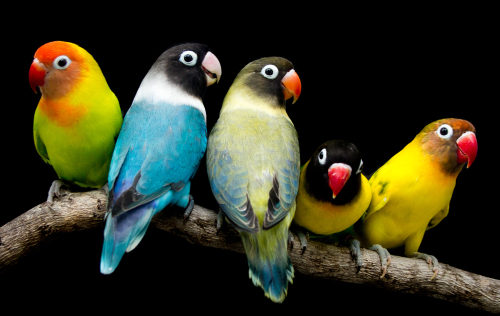
Which Birds Make the Best Pet Birds?
Maybe it’s the appeal of feathery snuggles or the hope of whistling tunes together. Or maybe you are looking for a lifelong companion… With their hilarious personalities and intelligence, birds make wonderful pets. But which pet bird is right for you? This guide can serve to introduce you to the most popular pet bird species and give some pointers to help you choose which bird species is right for you!
There are a few things to consider before buying any bird. No matter the type, pet birds require a hearty investment of both your money and time. Birds, especially parrots, are incredibly social and intelligent creatures. All birds need a lot of human attention – a minimum of two hours per day out of the cage, even for beginner birds. If you have the time and resources to dedicate, a pet bird makes the perfect companion!
Best Pet Birds for Beginners
A few bird species appeal more to families and first-time bird owners. Budgies, cockatiels, and lovebirds make great companions and are generally more amicable than their larger cousins.

Budgies
Incredibly popular as a first pet, budgies, also called parakeets or budgerigars, make a great choice for kids. These wee birds can grace your home with their pretty colors and jovial companionship. They love playtime and will enjoy riding around on your shoulder and playing with echoes and mirrors. You can find them in blues and grays to greens and yellows. Relatively quiet compared to some of the squawkers on this list, budgies can still learn to whistle or talk. Budgies specifically are native to Australia, though there are over 100 species of parakeet worldwide.
- Size: One of the smallest parrots, budgies are about 7 inches long.
- Lifespan: Budgies live for between 7-15 years, depending on care.
- Care Tips: Keep budgies in a cage with room to fly from perch to perch. Often, you want more horizontal than vertical space.

Cockatiels
Want a little bird with some spunk? The cockatiel has a sweet personality with a mohawked rocker look and is another excellent choice for beginner bird owners. Along with their crest, cockatiels are known for bright orange cheek spots. Outside these traits, cockatiels come in a variety of patterns, including grays, whites, and yellows. Another Australian native, these birds travel in flocks around the inland forests, looking for seeds and handing with their friends.
Cockatiels are very friendly and affectionate. A popular pet bird for kids, cockatiels love cuddling, head-scratches, and generally spending time with you. They love riding around on shoulders and being a part of your day. As a bonus, cockatiels can learn to whistle tunes, though males are more likely to pick up a melody than females.
- Size: The smallest member of the cockatoo subfamily (Cacatuinae), cockatiels range between 9-13 inches long.
- Lifespan: In the wild, cockatiels live between 10-14 years. With proper care, they often live to 25 years in captivity.
- Care Tips: Pretty good flyers, even with their wings clipped, cockatiels need plenty of room to stretch their wings in their cage. They also require a diverse diet. In addition to bird pellets, give your cockatiel veggies and seeds.

Lovebird
A bit more inquisitive and exploratory than the other small birds, the lovebird can be a sweet first pet bird. Once tamed, lovebirds love to play and are known for exploring pockets and shirtsleeves and playing with jewelry and toys. They love human attention and will bob around to catch your eye.
In general, lovebirds are extremely sweet and make a great companion for a family. However, there are a few things to note. Compared to budgies and cockatiels, lovebirds both have a much louder shriek and a much stronger bite. If they want attention or are annoyed at you, they will let you know. If you choose a lovebird, be prepared to dedicate time for play and training.
- Size: One of the smaller members of the parrot family (Psittacidae), lovebirds are about 6 inches long
- Lifespan: Lovebirds live between 10-20 years with attentive care
- Care Tip: Smaller birds can live in smaller cages, but make sure your lovebird has enough room to play and stretch its wings.
Advanced Pet Birds
If you have some experience raising and training birds, you might consider one of the larger advanced parrots. In general, the bigger the species, the more intelligent and higher maintenance birds. These pet bird species are a true step up in need for your time. Your lifestyle needs to be conducive to lots of training attention, as well as a commitment to their longer lifespans. Note that most of these bird species bond to a single human and can inflict a powerful bite. All of these birds need to be supervised around children.

Parrotlets
Little birds with a big personality, parrotlets are tiny, blue and green punks! Their size makes them easier to handle, though don’t assume these tiny squeakers to be as docile as a budgie. They are more similar to a macaw in temperament and have high requirements for attention and training. Parrotlets are a great choice for the more advanced pet owner who lives in an apartment!
- Size: One of the smallest birds on this list, parrotlets are about 5 inches long
- Lifespan: 15-20 years
- Care Tips: With daily love and training, parrotlets can be very affectionate pets!

Conures
The socialites of Central and South America, Conures love to play and have a sneaky sense of humor. Coming in a wide variety of bright colors, conures are incredibly beautiful birds. They love playtime and use their bills to explore. Giving them plenty of toys to chew will entertain them and protect your furniture! If well-socialized, they make the perfect companion for the whole family. Though if they haven’t had proper training, they are known to have screeching outbursts and pretty hard bites.
- Size: A medium-sized parrot, conures are about 14 inches long.
- Lifespan: Conures live between 20 and 30 years in captivity.
- Care Tips: Conures need a cage with plenty of room to climb and play. Lots of toys and a variety of perches will make a suitable habitat.

Macaws
Big, beautiful, and boisterous, a macaw on the shoulder is a classic image that comes to mind of a pet bird. Native to Central and South America as well as the Caribbean Islands, there are a handful of species that come in a variety of colors. From the gorgeous blue of the hyacinth macaw to the primary patterns of the scarlet macaw, these parrot species undoubtedly add eye-catching drama to your life. These big birds come with big personalities! Another formidable pet for beginners, they can be delightful, sociable companions with the proper training and attention.
- Size: Macaws range from 12-36 inches long, depending on the species.
- Lifespan: 30-50 years, depending on the species and care.
- Care Tips: Macaws take up space in your home and your life! They need a large cage with plenty of toys. For many larger parrots, we recommend you build an extra playground space in addition to their toys in their cage.

African Grey Parrot
Known as the most intelligent bird on the planet, African Greys are a pet to impress. Native to central Africa, the United Nations has banned the trade of this genius bird due to its declining population. So if you’re in the market for an African Grey, find a reputable breeder!
Besides beating Harvard students in a memory test, African Greys make very entertaining pets. They form incredibly close bonds, though usually just to a single human. They need lots of attention and mental stimulation.
- Size: A medium-sized parrot, African Greys are about 13 inches long.
- Lifespan: Adopting an African Grey as a pet is a very serious commitment. With the proper care, African Greys can live up to 80 years.
- Care Tips: Without proper care, they can be stressed, sick, and self-destructive. While these birds are incredibly charming and it may be tempting to have such an intelligent feathered friend, we discourage most pet owners from adopting one if you don’t have the skill level and commitment required to care for an African Grey.

Cockatoos
The cuddle bugs of the bird world, cockatoos bring beauty and fun to a bird-lover’s life. They are known for being extremely affectionate and bonding closely with their owners. Silly birds, cockatoos put on entertaining dances and have even been known to keep a beat. This great personality must be earned, however, with plenty of attention and proper training. Without the proper care, cockatoos can be self-destructive. Cockatoos have a high surrender rate, meaning that many people tried adopting them before realizing they were too much effort.
- Size: One of the larger pet birds, a cockatoo is about 20 inches long.
- Lifespan: Cockatoos can live up to 80 years old.
- Care Tips: If hand-weening a cockatoo, intersperse interaction time with time alone in the cage. That way, the baby cockatoo will get used to occasionally entertaining itself on its own. If you are away from your cockatoo, make sure it has plenty of toys and some tunes to listen to!
Finding a Breeder for Your Pet Bird
Whichever pet bird species you choose, the next step is to find a reputable breeder. While many pet shops offer a variety of parrots, some source them from bird mills that value profits over the sweet lives of the birds. Check out your local aviculture society or exotic bird club to get recommendations for a breeder that loves and cares about the birds as much as you do!
Last tip: before adopting, find a well-reviewed avian vet in your area. It’s good to be connected with one before your bird gets sick. Because they are prey animals, birds hide signs of illness, so all birds benefit from yearly checkups.
Now that you’ve found a breeder and a vet, you are ready to adopt! We wish you the happiest days with your sweet feathered friend!
Check us out on EarthSnap, a free app brought to you by Eric Ralls and Earth.com.












